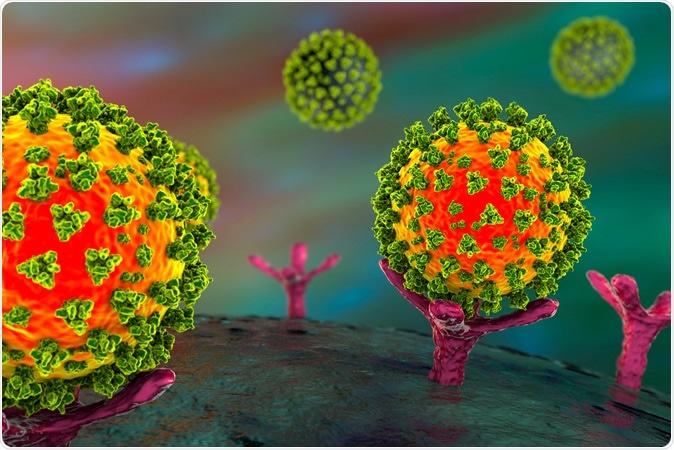A team of researchers from have found an antiviral therapy that seems to be an effective treatment for patients with moderate coronavirus disease 2019 (COVID-19).
Treating confirmed cases of COVID-19 with interferon (IFN)-α2b significantly reduced the time that virions were detectable in the respiratory tract and reduced the duration of elevated levels of two inflammatory biomarkers - interleukin(IL)-6 and C-reactive protein (CRP).
“These findings suggest that IFN-α2b should be further investigated as a therapy in COVID-19 cases,” write the researchers in the journal Frontiers in Immunology.
SARS-CoV-2 can cause severe symptoms
Unlike some human coronaviruses that only infect the upper respiratory tract and cause mild disease, severe acute respiratory syndrome coronavirus 2 (SARS CoV-2) also infects the lower respiratory tract, causing more severe clinical symptoms that resemble those seen with SARS-CoV and the Middle East respiratory syndrome (MERS).

SARS-CoV-2 viruses are binding to ACE-2 receptors on a human cell, the initial stage of COVID-19 infection. Illustration Credit: Kateryna Kon / Shutterstock
Since the outbreak of COVID-19 in Wuhan, China last year, SARS-CoV-2 has swept the globe and become pandemic. There are no available vaccines or antivirals that have yet been approved for prevention or therapy.
Type I IFNsα/β broad-spectrum antivirals have previously been shown to exert an inhibitory effect on viral replication and to aid viral clearance.
During the2003 SARS outbreak, Eleanor Fish (Toronto General Hospital Research Institute) and colleagues found that treating hospitalized patients with interferon IFN-α, helped to resolve lung abnormalities among the SARS patients, compared with those who were not treated with IFN-α.
The team also knows that another broad-spectrum antiviral called arbidol (ARB) triggers interferon production and exhibits antiviral activity against viral respiratory infections, including coronaviruses.
What did the study involve?
Now, the team has tested the therapeutic effects of another interferon, IFN-α2b, among 77 patients with confirmed COVID-19 who were admitted to Union hospital, Tongi Medical College in Wuhan, China.
The researchers retrospectively analyzed patients who had been treated with IFN-α2b, ARB, or a combination of the two between January 16th and February 20th, 2020.
All patients had moderate clinical disease and had not required oxygen supplementation in intensive care.
Real-time polymerase chain reaction (RT-PCR) was used to test throat swabs for SARS-CoV-2, and blood samples were used to check cell counts, blood biochemistry, and serum cytokine levels. Each patient also had their temperature and blood oxygen saturation levels checked throughout the duration of their hospital stay.
Treatment with IFN-α2b accelerated viral clearance
The researchers found significant between-group differences in the rate of viral clearance, which was defined as the number of days between symptom onset to the time that two consecutive PCR tests taken at least 24 hours apart were negative for the virus.
The analysis showed that treatment with IFN-α2b, either alone or in addition to ARB, significantly accelerated clearance of the virus from the upper respiratory tract, compared with ARB treatment alone. Circulating levels of the inflammatory biomarkers interleukin-6 (IL-6) and C-reactive protein (CRP) were reduced among patients treated with IFN-α2b, compared with patients who received ARB alone.
When the analysis adjusted for potential confounding factors such as age, gender, and comorbidity, the effects of IFN-α2b on viral clearance, IL-6, and CRP remained the same.
The findings provide novel insights
The authors say their findings provide new insights into COVID-19, mainly as IFN-α2b therapy seems to shorten the duration of viral shedding:
“Notably, reduction of markers of acute inflammation such as CRP and IL6 correlated with this shortened viral shedding, suggesting IFN-α2b acted along a functional cause-effect chain where virally induced inflammation represents a pathophysiological driver.”
The researchers say the findings support the plausibility of IFN-α2b as a treatment for patients with COVID-19 disease.
A follow up trial “is now warranted”
“To our knowledge, the findings presented here are the first to suggest therapeutic efficacy in COVID-19 disease of IFN-α2b, an available antiviral intervention,” writes the team. “While we recognize that these data are at best suggestive, given the urgency, the findings indicate that a follow-up randomized placebo-controlled clinical trial (RCT) is now warranted
In conclusion, the researchers also point out that as well as the potential benefit too patients, “treatment with IFN-α2b may also benefit public health measures aimed at slowing the tide of this pandemic, in that duration of viral shedding appears shortened.”